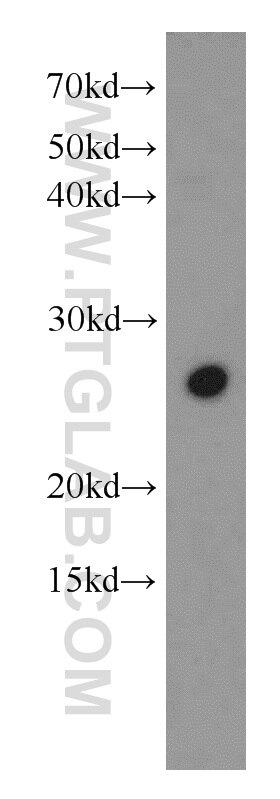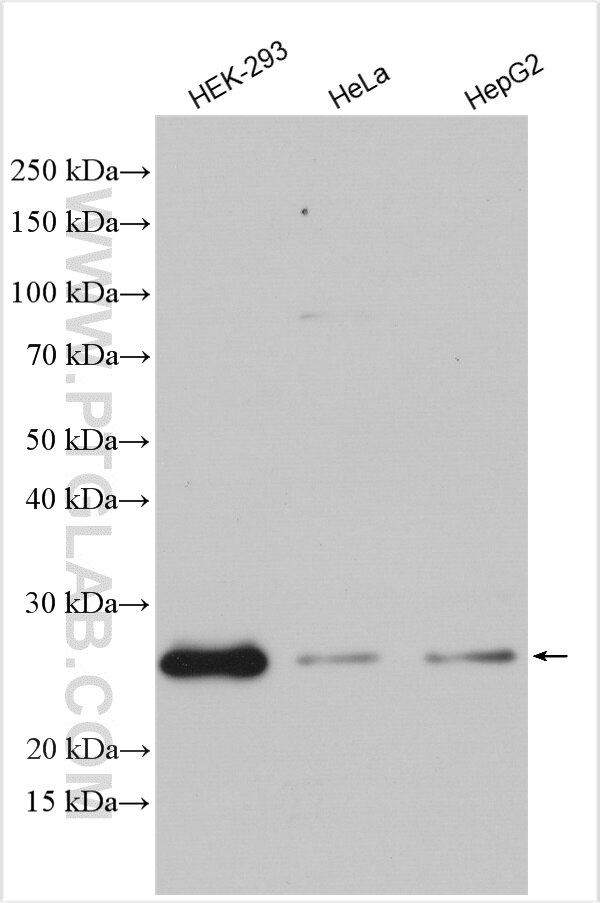- Featured Product
- KD/KO Validated
SFRS9 Polyklonaler Antikörper
SFRS9 Polyklonal Antikörper für WB, ELISA
Wirt / Isotyp
Kaninchen / IgG
Getestete Reaktivität
human, Maus, Ratte
Anwendung
WB, ELISA
Konjugation
Unkonjugiert
Kat-Nr. : 17926-1-AP
Synonyme
Galerie der Validierungsdaten
Geprüfte Anwendungen
| Erfolgreiche Detektion in WB | HEK-293-Zellen, HeLa-Zellen, HepG2-Zellen |
Empfohlene Verdünnung
| Anwendung | Verdünnung |
|---|---|
| Western Blot (WB) | WB : 1:500-1:2000 |
| It is recommended that this reagent should be titrated in each testing system to obtain optimal results. | |
| Sample-dependent, check data in validation data gallery | |
Veröffentlichte Anwendungen
| KD/KO | See 1 publications below |
| WB | See 6 publications below |
Produktinformation
17926-1-AP bindet in WB, ELISA SFRS9 und zeigt Reaktivität mit human, Maus, Ratten
| Getestete Reaktivität | human, Maus, Ratte |
| In Publikationen genannte Reaktivität | human |
| Wirt / Isotyp | Kaninchen / IgG |
| Klonalität | Polyklonal |
| Typ | Antikörper |
| Immunogen | SFRS9 fusion protein Ag12347 |
| Vollständiger Name | splicing factor, arginine/serine-rich 9 |
| Berechnetes Molekulargewicht | 221 aa, 26 kDa |
| Beobachtetes Molekulargewicht | 26 kDa |
| GenBank-Zugangsnummer | BC093973 |
| Gene symbol | SFRS9 |
| Gene ID (NCBI) | 8683 |
| Konjugation | Unkonjugiert |
| Form | Liquid |
| Reinigungsmethode | Antigen-Affinitätsreinigung |
| Lagerungspuffer | PBS mit 0.02% Natriumazid und 50% Glycerin pH 7.3. |
| Lagerungsbedingungen | Bei -20°C lagern. Nach dem Versand ein Jahr lang stabil Aliquotieren ist bei -20oC Lagerung nicht notwendig. 20ul Größen enthalten 0,1% BSA. |
Hintergrundinformationen
SFRS9 is a member of the serine/arginine (SR) splicing factor family, which contains an N-terminal RNA recognition motif (RRM), a glycine-rich region, an internal region homologous to the RRM, and a long (315-amino-acid) C-terminal domain composed predominantly of alternating serine and arginine residues. SRSF9 has been linked to the occurrence and progression of hepatocellular carcinoma (HCC), colorectal cancer (CRC) and oral squamous cell carcinoma (OSCC). In HCC and CRC, the knockdown of SRSF9 inhibited the proliferation and migration of cancer cells, cell cycle progression and colony formation of cancer cells (PMID: 34336668,35971121).
Protokolle
| Produktspezifische Protokolle | |
|---|---|
| WB protocol for SFRS9 antibody 17926-1-AP | Protokoll herunterladen |
| Standard-Protokolle | |
|---|---|
| Klicken Sie hier, um unsere Standardprotokolle anzuzeigen |
Publikationen
| Species | Application | Title |
|---|---|---|
Nat Commun Mutually exclusive acetylation and ubiquitylation of the splicing factor SRSF5 control tumor growth. | ||
Nucleic Acids Res Sequence-dependent recruitment of SRSF1 and SRSF7 to intronless lncRNA NKILA promotes nuclear export via the TREX/TAP pathway. | ||
Hum Mutat Antisense oligonucleotides modulate dopa decarboxylase function in aromatic l-amino acid decarboxylase deficiency. | ||
Cell Death Dis Chemotoxicity-induced exosomal lncFERO regulates ferroptosis and stemness in gastric cancer stem cells. | ||
BMC Med Genomics High expression of serine and arginine-rich splicing factor 9 (SRSF9) is associated with hepatocellular carcinoma progression and a poor prognosis
|
Rezensionen
The reviews below have been submitted by verified Proteintech customers who received an incentive forproviding their feedback.
FH Jingwen (Verified Customer) (04-28-2021) | The staining signal showed up inside the nucleus.
|



